June 2012 Archives
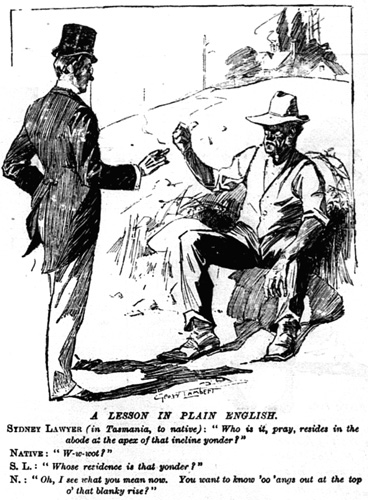
It seems the reports were a little doctored by a certain media outlet to give the impression that James was on the way out. The man himself explains, and John Birmingham sees an interesting side of the story.
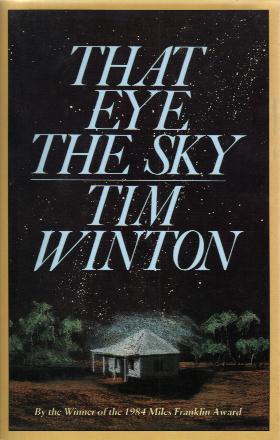
That Eye the Sky by Tim Winton, 1986
Cover illustration by Beth Turner
McPhee Gribble edition 1986
Best First Fiction
Boyd Anderson Ludo
Allan Barbeler An Absence of Discretion
Andrez Bergen Tobacco Stained Mountain Goat
Claire Corbett When We Have Wings
Virginia Duigan The Precipice
Y.A. Erskine The Brotherhood
Maggie Groff Mad Men, Bad Girls and the Guerrilla Knitter's Institute
Sylvia Johnson Watch Out For Me
Melanie Joosten Berlin Syndrome
Stuart Littlemore Harry Curry: Counsel of Choice
Noel Mealey Murder and Redemption
Daniel O'Malley The Rook
Alastair Sarre Prohibited Zone
Peter Twohig The Cartographer
Kim Westwood The Courier's New Bicycle
Gas Wylde Casino Kurnell
Best Fiction
Lenny Bartulin De Luxe
A.A. Bell Hindsight
Honey Brown After The Darkness
J.C. Burke Pig Boy
Peter Corris Comeback
Miranda Darling Siren's Sting
Garry Disher Whispering Death
Jaye Ford Scared Yet?
Kerry Greenwood Cooking the Books
Brett Hoffmann The Race
Katherine Howell Silent Fear
Stephen M Irwin The Broken One
Malcolm Knox The Life
Adriana Koulias The Sixth Key
Nansi Kunze Dangerously Placed
Tobsha Learner The Map
Stuart Littlemore Harry Curry: Counsel of Choice
Colleen McCullough The Prodigal Son
Barry Maitland Chelsea Mansions
Kel Robertson Rip Off
Michael Robotham The Wreckage
Jennifer Rowe Love, Honour & O'Brien
Kirsten Tranter A Common Loss
Peter Twohig The Cartographer
Kim Westwood The Courier's New Bicycle
Felicity Young A Dissection of Murder
Best True Crime
Hilary Bonney The Double Life of Herman Rockefeller
Peter Corris Mad Dog
Eamonn Duff Sins of the Father
Michael Duffy Call Me Cruel
Lucy Frost Abandoned Women
Fiona Harari A Tragedy in Two Acts
Rochelle Jackson Partners and Crime
Rachael Jane Chin Nice Girl
Kevin Morgan Detective Piggot's Casebook
Kevin Morgan Gun Alley
James Morton and Susanna Lobez Gangland Melbourne
James Morton and Susanna Lobez Gangland Sydney
Stephen Orr The Cruel City
Liz Porter Cold Case File
Mark 'Chopper' Read Road To Nowhere
Kay Schubert Perfect Stranger
Adam Shand Outlaws
David Spiteri The Prez
There are no details at this time as to when the shortlists will be released nor when the winner will be announced. It's generally best to keep an eye out around the start of August for the shortlists and the end of the month for the winner.
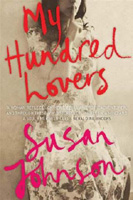 |
My Hundred Lovers Susan Johnson Allen & Unwin 2012 |
From the publisher's page:
That afternoon in the small bedroom the light was blue. The curtains were cream and blew softly in the wind. There was a cry, far off, almost out of earshot. There was a man in my bed and I did not know how he got there.
A woman, on the eve of her fiftieth birthday, reflects on one hundred moments from a lifetime's sensual adventures. After the love, hatred and despair are done with, the great and trivial acts of her bodily life reveal an imperfect, yet whole self. By turns humorous, sharp, haunting and wise, this is an original and exhilarating novel from one of Australia's premier writers.
Lyrical and exquisite, My Hundred Lovers captures the sheer wonder of life, desire and love.
Reviews
Emma Young in "The Sydney Morning Herald": "Johnson's eighth novel is the chronicling of one woman's sensory memory. Deborah, the narrator, is a middle-aged woman reflecting on the touch and feel of years past. Her thoughts take the form of an unconventional memoir: 100 brief chapters catalogue her experiences of love. What she composes is a history of her body, her tiring flesh a map of what she has 'lived, loved and suffered'...The form developed by Johnson has as much impact as the substance it's shaped around. The short chapters, devoted to the evocation of sensual experiences and not the steady beat of chronology, construct a story that is meaningful, but also playful...In the literary tradition, men have largely shaped notions of desire and sexuality. Think Casanova, Henry Miller and Michel Houellebecq. Female writers such as Angela Carter, Erica Jong and Jeanette Winterson have negotiated the terrain, but with less frequency...My Hundred Lovers is an original imagining of one woman's waning flesh and the vibrant imprint of a life it still holds."
Felicity Plunkett in "The Canberra Times": "Since her debut novel, Messages from Chaos, Johnson's writing has explored the embodied heart and imagination. There, protagonist Anna defines and curtails her own happiness through her relationship with her married lover. Since then, Johnson's work has often taken in abjection and pining, perhaps most strikingly in the eroticism and loss of Hungry Ghosts, in which two women friends find themselves in a destructive triangular relationship...In her powerful non-fictional work A Better Woman, Johnson writes about birth and motherhood. While her craft is such that a fictional 'I' is often assumed to be autobiographical, in this case craft and crafting - and in very literal ways the making and remaking of women's bodies and lives - brings the necessary artifice of life-writing into focus. At the same time, it offers a raw expression of feelings of loss in motherhood...Johnson's melding of lyrical moments with anatomical detail and bawdy humour makes for a lively catalogue of 50 years of love, but wrapped around this is another layer that enriches the novel. Johnson returns to the observation that it is a rare kind of privilege that allows the sensual to be life's crucial focus...There's not much of the dull or leisurely in Johnson's novel, but her framing of the novel's pleasures with a similar philosophical stance is provocative."
Chris Flynn in "Meanjin": "My Hundred Lovers is a remarkable achievement, a genuine masterpiece of sensuality that took Johnson more than a decade to get her head around. The first thing to understand is Johnson's shrewd interpretation of the word 'lovers'. This is not the story of a woman looking back on her life bonking a hundred people--the lovers here take many forms, including sunshine, her fingers, a certain type of croissant, a cat, a bridge. There are people here too, of course, men and women, and sex is not always a prerequisite for them to be considered lovers...The French influence on Johnson is clear--parts of the story are set in a version of Paris that's as close as I've seen to the city being faithfully captured on the page for a long time. You won't find a better French book written by an Australian, and as far as erotic writing goes, forget the shades of grey and look a little closer to home. Australians have this genre well and truly licked."
Chris Gordon of "Readings": "This could be a corny novel, but no, in Johnson's hands reality and poetry mix to create a profound description of a woman's life. There is the rawness and the vulnerability that comes with such an expose, but there is also humour and humility."
Joanne Shiells on the "Fancy Goods" weblog: "Expected to attract a mostly female audience, this rich and meaningful novel deserves a broad readership. It is easily readable and poetic; Johnson's gift for language delights and some of her descriptions are to be savoured. With much of the novel set in France, it may also appeal to those with a penchant for the Gallic."
Interviews
Helen Greenwood in "The Age".
The author answers "Ten Terrifying Questions" on the "Booktopia" weblog.
Other
A little background from the author on how the novel came about.
You can read an extract from the novel on the publisher's website here.
Unvexed I go,
Companioned by the splendid dead,
Though well I know
Of broken lives to Moloch fed,
Of sordid shifts for dally bread,
And bartered souls who, drifting, dread
Life's turgid flow.
I joy in gallant company,
Where sage and bard,
With wisdom, faith, and prophecy,
All earth regard;
They trace man's lowly ancestry,
They seek to plumb all mystery,
They sing romance, high fantasy,
Thought's treasured nard.
Would all might share this world apart,
There win release
In life as re-create by art,
Where discords cease!
Through solitude or clamorous mart,
When threatens doom with poison dart,
By faith, and visition stayed, the heart
Knows cool deep peace.
First published in The Sydney Morning Herald, 4 June 1932
The Oxford English Dictionary has finally included the word "bogan", a classic Aussie term. The dictionary defines the word as a "depreciative term for unfashionable, uncouth, or unsophisticated person, esp. of low social status".
John Birmingham describes the slow decline and fall of the Fairfax empire as "our fault", as we aren't buying the papers. He's correct, but not about me, of course - I have a subscription. Trouble is Fairfax were warned about this and should have seen it coming years ago. And I still miss the late-lamented "Nation Review".
Susan Johnson has been busy doing the rounds promoting her latest novel My Hundred Lovers. Seems a few people have been a bit misled by that title. Can't think why.
While probably not having the same number of "horizontal dancing partners" Fifty Shades of Grey by E.L. James seems to have as many imitators.
Stephen Romei of "The Australian" was in Brisbane to see the presentation of the Miles Franklin Award to Anna Funder the other night. You can read his account of how the winner was decided and then have a look at the absent author's acceptance speech:
His sins were scarlet, but his books were read.
-- Hilaire Belloc.
Many years ago now Henry Kendall, that lost child of a mellower civilization, bewailed the hardships which befall "a man of letters here." There is no New Grub street in Australia, but the reporters' room of a newspaper, and the ledger of a city firm here and there might tell of inkier servitudes than those of Gissing's sombre heroes in the murk of London's literary underworld. "Genius," says one critic finely, "though it may often desire money and fame, is never silenced by the lack of either," and there is always a comfortable tradition that poets will be poets in spite of us. What is there to hinder a man dashing off a three volume novel on his Saturday afternoons or late nights at the office? Tolstoy, who had an austere belief in the sweat of the brow, would even have held that an author was the better for it. Australian writers, however, have not flourished under these conditions; and it is even beginning to be suspected that leisure, or, in other words, the assurance of an income, is a favourable condition for good literary work. Few men, in setting out to write a masterpiece, can quite free themselves from the ignoble anxiety of how they and their dependants are to live in the meantime. In Australia the settled income is still almost exclusively associated with families newly enriched by commerce, which circles; however valuable their contributions to trade, have not often displayed leanings to literature. The would-be man of letters, bereft both of the princely patron of old and the unearned increment which is his substitute in older civilizations, relies for his leisure on democracy's interest and appreciation. Has democracy any interest and appreciation for Australian literature?
Views from a Bookshop.
Adelaide booksellers, deep in preparation for Australian Authors' Week, expressed varying opinions on the question. Mr. F. W. Preece, President of the Associated Booksellers of Australia and New Zealand, was, unfortunately, too ill to be interviewed; but Mr. E. H. Lowe, secretary of the Adelaide Association, who is also the manager of the Methodist Book Depot, suggested that if Australians did not appreciate Australian books after Authors' Week it would not be the book sellers' fault. He explained that in Melbourne the Associated Booksellers were working through press, platform, and wireless, and had given prizes for a "slogan." The competition had resulted in such bright ideas as 'Buy books by Australian writers now and by and by,' and 'Australian writers write the right books; buy one by one.' Adelaide booksellers clung to the Adelaide tradition that dignity and dulness were not synonymous, and preferred a quieter poster. They were all supporting Authors' Week in proportion to their smaller numbers, and relied on a joint advertisement and window displays of nothing but Australian books to capture the bookbuyers' interest.
As manager of the Methodist Book Depot, Mr. Lowe could not express an opinion on the general attitude to Australian books. He could only indicate the attitude of Methodists, which was to show interest in books by ministers' daughters, but restricted enthusiasm in other directions. "Take," he said, "this fairy book by Pixie O. Harris. It is a delightful thing, but we can't sell it. Our people do not care for fairy tales. We can sell any number of Bible stories and copies of "Pilgrim's Progress," but fairy tales sent out for children's prizes are almost invariably returned. In fact, we don't send them now. The novels of Miss Dorothy Langsford have a great sale among our people."
Speaking, not as the manager of the Methodist Book Deport, but as a bookseller of wider experience, Mr. Lowe held that there was a distinct prejudice against books by Australian writers. "Unless there is some strong personal interest, or interest in the historical events described, Australian readers don't want them."
At Tyrrell's.
Mr. S.J. Stutley, happily at home in the bookish and delightful atmosphere of Tyrrell's, Limited, responded in a manner befitting the surroundings, which always seem to suggest that even in this hasty and commercial age there is still room and leisure for talk on general ideas. "I suppose," he said candidly, "that you know as well as I do what the public's attitude has been to Australian literature, It has been apathetic. It is only just lately, since the war in fact, that bookbuyers have realized that Australians can write. Now Angus & Robertson have printed at least half a dozen novels, which have been as well received as English novels of the same type, and as well read as if they had been published in England with all the advantages of the advertising of well-organized publishers. In England, too, the tide has turned. At least two leading firms of publishers, Hodder & Stoughton and Hutchinson's, have representatives in Australia, keeping a lookout for Australian novels.
"A good example of changed, conditions is the fate of Katherine Susannah Pritchard's "Working Bullocks." That is a really fine thing, outstanding among Australian publications. Her "Pioneers" met with very meagre success. This is a much more mature work, showing real power, and it has been readily recognised both in Australia and England. It is a novel of the dairy districts, and very realistically written. Jonathan Cape, who brought out the English edition, wrote asking her to tone down the expressions used in some of the dialogue, but she cabled, in effect, "What I have written, I have written," and they thought so highly of the work, that they accepted her ruling. We have just cabled to England for more copies-- a thing most rare with an Australian novel-- and have received a reply that more are being printed so that apart from its Australian success it has made an impression in England." Mr. Stutley touched on Australian publishing, and expressed the opinion that at present it was best for Australian writers to publish in Australia, with the prospect of an English edition if their venture proved successful. It was the hardest test. The Platypus series of cheap reprints were going to make a difference, he thought, to the Australian prospects.
Fairy Books and Others.
Mr. J. Morley Bath, manager of Rigby's, Limited, is one of the most enthusiastic workers for Australian Authors' Week. He believes intensely in encouraging Australian writers, and shows his belief very practically by publishing their books. The Australian text books published by Rigby's are well known, and include works by A. Grenfell Price. Gordon L. Wood. M.A., and Cyril M. Ward, M.A. Their publications, however, are often in lighter vein, and Mr. Bath, rejoices in the distinction of being Pixie O. Harris's "Fairy Publishers," and appearing in her marginal illustrations complete with bowler hat. umbrella and wings. He also published Maud Renner Liston's "Cinderella's Party"' Mr. Bath has been most anxious that Adelaide should do its part in Australian Authors' Week, and has worked hard in the cause.
Missing Colour.
Mr. B. B. Beck, of Cole's Book Arcade, has seen many changes in the public taste for books, and is now slow to predict. He thinks, that the readers he is most in touch with care little for Australian, or even for English books, compared with the American novel.
"There," he said, "they find picturesque scenery, the romantic events of two wars, the glamour of Red Indian life, and adventures among primitive conditions. We have as yet no distinctly Australian colour. Most of the novels written here might be written about any part of the continent. Mr. Gask, the dentist, writes detective stories, which are translated into three or four languages, but they are translated because they are detective stories, not because they are Australian. Mrs. Doudy's "Magic of Dawn" sold because of the interest in historical events connected with it. We have as yet no distinctly Australian architecture, no Australian costume even. Australian readers will read more Australian books when they have the interest of strong local colour."
From all of which the aspiring Australian author may or may not, draw comfort.
First published in The Register, 10 September 1927
[Thanks to the National Library of Australia's newspaper digitisation project for this piece.]
The announcement was made at a ceremony held in Brisbane last night. You can read about the novels on the shortlist here.
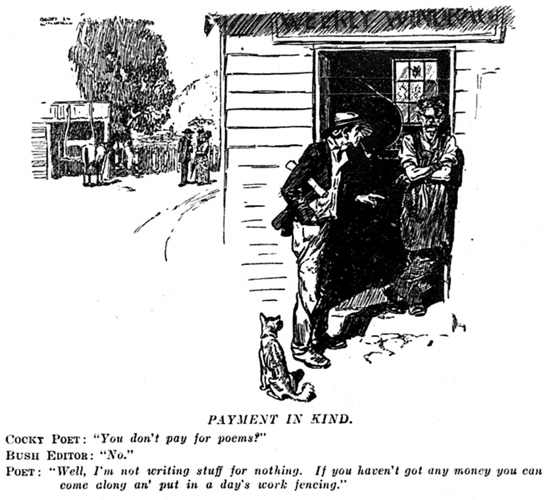
Stephen Romei in "The Australian", and Jason Steger in "The Age" both give a rundown on the contenders. All That I Am by Anna Funder is the clear favourite but Romei plunks for Moorhouse and Steger points out that Mears is actually at shorter odds with Sportsbet.
West Australian novelist Katherine Susannah Prichard, of Greenmount, has been nominated for the Nobel Prize in literature.
Confirming this today, author John K. Ewers said that the WA section of the Fellowship of the Australian Writers was invited by the Nobel committee of the Swedish Academy to nominate a candidate.
English professor Alan Edwards of the University of Western Australia readily consented to support the nomination which was sent to Sweden a fortnight ago.
Professor Edwards said that he could think of no Australian writer who better deserved the honour than Katherine Susannah Prichard.
"A very large meeting of the fellowship unanimously endorsed this opinion," said Mr. Ewers.
It is believed that the invitation to the WA Fellowship came as a result of an article by Mr. Ewers in a Melbourne weekly paper last December titled.- "Why not a Nobel Prize for Australian Writers?"
* Katherine Susannah Prichard, widow of WA Victoria Cross winner Hugo Throssell, has become a world figure in literature. Some of her work has been translated into French, Russian, Polish, Czech, Slovak, Hungarian and Afrikaans. Four of her novels have been published in America. She won a £1000 competition in London in 1915 with The Pioneers. Working Bullocks was published in 1926. In 1928 she shared first prize in a Bulletin competition with Coonardoo.
First published in The Daily News, 15 March 1950[Thanks to the National Library of Australia's newspaper digitisation project for this piece.]
The longlists for these awards have now been announced as follows:
Gold Inky Award
Shift by Em Bailey
Night Beach by Kirsty Eagar
Brotherband 1: The Outcasts by John Flanagan
Act of Faith by Kelly Gardiner
Queen of the Night by Leanne Hall
Blood Song by Rhiannon Hart
Sea Hearts by Margo Lanagan
The Coming of the Whirlpool: Ship Kings 1 by Andrew McGahan
The Deep: Here Be Dragons, Volume 1 by Tom Taylor (illustrated by James Brouwer)
The Reluctant Hallelujah by Gabrielle Williams
Silver Inky Award
Bitterblue by Kristin Cashore
BZRK by Michael Grant
The Fault in Our Stars by John Green
Why We Broke Up by Daniel Handler
Storm: Elementals 1 by Brigid Kemmerer
Legend by Marie Lu
A Monster Calls by Patrick Ness (illustrated by Jim Kay)
Lola and the Boy Next Door by Stephanie Perkins
The Scorpio Races by Maggie Stiefvater
Daughter of Smoke and Bone by Laini Taylor
Voting opens on the "Inside a Dog" website on 27th August.
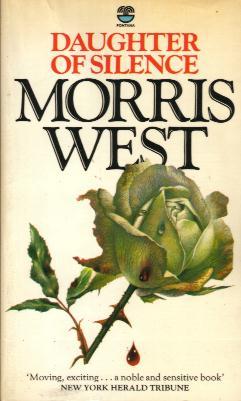
Daughter of Silence by Morris West, 1961
Cover illustration by Tom Adams
Fontana editon 1976
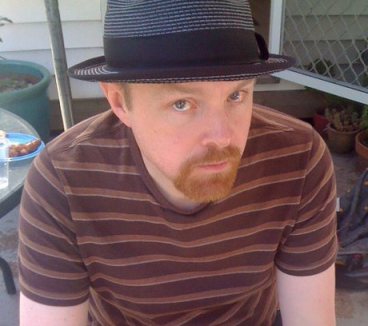 |
Adam Ford is a poet and novelist who lives in Castlemaine in country Victoria. The "Wild Colonial Girl" is aiming to move to that town and recently spoke to Adam about living in Castlemaine and the literature scene there. |
Are there any books set in the area?
Fiction? Not that I know of, which is unforgiveable of me. There probably are -- I'll have to look into that. I have read a few local histories, and know of some others that are about. I have also read and heard a number of poems about the area, but nothing specifically set up as "poems about Castlemaine".
What's Castlemaine Word Mine? Why was it set up?
I came along post-establishment, but the brief version is that it's a group of writers who've set up a non-profit organisation to promote writing and reading in the area. We run a monthly reading series and are starting to offer a few writing workshops as well. We have worked and are developing plans to work more in partnership with other writing and reading organisations in the area, like the local library, local art festivals, local independent journalism websites and the like. We were set up around mid-2011, so it's early days for us yet.
The winners were:
Best Book
Shehan Karunatilaka, Sri Lanka, Chinaman: The Legend of Pradeep Mathew
Vintage Publishing, Random House India
Best Short Story
Emma Martin, New Zealand, Two Girls in a Boat
You can read the full list of the regional winners here.
Put beeswax on your easy chair,
Take reams of paper, nib your pen,
And ruffle your poetic hair!
Don't write of love -- it's out of date --
But try your hand at something new;
Work out a subject really great,
And make it brilliant, if not true!
And, if you're lacking for some rhymes,
Look up the poets -- they'll supply you --
'Tis one of those quite venial crimes,
For which the public won't decry you!
You pause in doubt? A phase of Greek
Will turn your lines in proper metre;
Or, if in French a rhyme you seek,
Your verses will appear much sweeter.
And then I think, if I were you,
I wouldn't send them to the papers,
But twist them up -- I often do --
Into the neatest smoking papers.
First published in The Australian Town and Country Journal, 30 December 1903
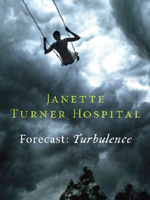 |
Forecast: Turbulence Janette Turner Hospital HarperCollins 2011 |
[This collection of short stories has been shortlisted for the Prime Minister's Literary Award.]
From the publisher's page:
Violent weather pervades this breathtaking collection, reflecting the cataclysmic emotions swirling through the lives of the protagonists. A loner becomes obsessed with the beautiful face of a neighbour, a child and his enigmatic grandmother sit out a hurricane, two fragile girls visit their stepfathers in prison and share a macabre ritual, a young woman is deeply ashamed of what her father has become ...
Janette Turner Hospital sensitively weaves stories of heartbreaking poignancy, shocking power and steadfast resolve, all honouring a universal question: how can we maintain equilibrium in a turbulent and uncertain world?
The turbulent river rushes on. ′Everything flows,′ wrote Heraclitus, ′and nothing stays fixed.′
Reviews
Peter Craven in "The Sydney Morning Herald":"Janette Turner Hospital is one of the most formidable writers to hail from Australia and she is also one of nature's storytellers. Her work has a narrative momentum and an effortless dramatic vibrancy that make her a deeply traditional entertainer at the same time that she is unmistakably a writer of gravity and power...Both her prophetic novel, Due Preparations for the Plague, and Orpheus Lost, another dark-angled take on terrorism, with its own redemptive twists, were serious works of art...Now, in a slender book of short stories, which includes a memoir of Brisbane and the passing of the author's mother, she gives her own take on the Shakespearean phrase, infinite riches in a little room...These stories exhibit a masterly control of tempo and an ability to compel the reader to see the life they unfold. Each packs the punch and yields the poignancy that only a master of the art of fiction can deliver."
Tali Lavi in "The Melbourne Review": "Janette Turner Hospital is chameleonic. Within her storytelling, styles, voices and places metamorphose. When faced with a new literary offering, one approaches it with a sense of trepidation; her narratives are as likely to fell the reader with devastating blows as they are to enrapture...Forecast: Turbulence is populated by storms, both of the atmosphere and of human behaviour. Nature's furore is to be feared, but it has nothing on the cruelty of people. Not that Turner Hospital is misanthropic - a spirit of humanism permeates her writing - but there is an unwillingness to turn away from a reality that oftentimes contains evil. As is testified by a character who quotes Hamlet to his daughter, 'There are more things in heaven and earth, Horatio, than are dreamed of in your philosophy.' This might be the author's own tenet, for she has admitted to inspiration from the pages of the New York Times."
Lisa Hill on the "ANZLitLovers" litblog: "Hmm, maybe it's because the Queen's Birthday holiday and the recent jubilee non-event in Australia has focussed my attention on cultural nuances, but it didn't take long for this book to irritate me. I'd read Janette Turner Hospital's Orpheus Lost (2008) and Due Preparations for the Plague: A Novel (2004) and enjoyed them both so I was expecting to like this too. But no, I didn't, and I'm peeved that I put aside other books to read it...Most of the themes are universal, tied together by the motifs of extremes of weather and climate. Her characters are relevant in the modern world: damaged souls struggling for psychological balance in fractured families or isolated from ordinary life in some way. The stories are neatly constructed and there is some beautiful writing."
Paula Green in the "New Zealand Herald": "Her latest collection of short stories, Forecast: Turbulence, reflects the experience and attachment she feels to both Australia and the United States...The turbulence of the title keys us into the parts weather and water play, but that turbulence also works on a metaphorical level. These are stories where life gets flung against the unexpected spikes and storms of living. These are stories, that at times, set your own guts in turmoil and you wonder if you can keep reading."
Interviews
Kate Evans on ABC's RadioNational "Books and Arts Daily" program.
Stephen Romei in "The Australian".
Jo Case of The Wheeler Centre.
Other
You can read sample pages from this collection on the publisher's page.
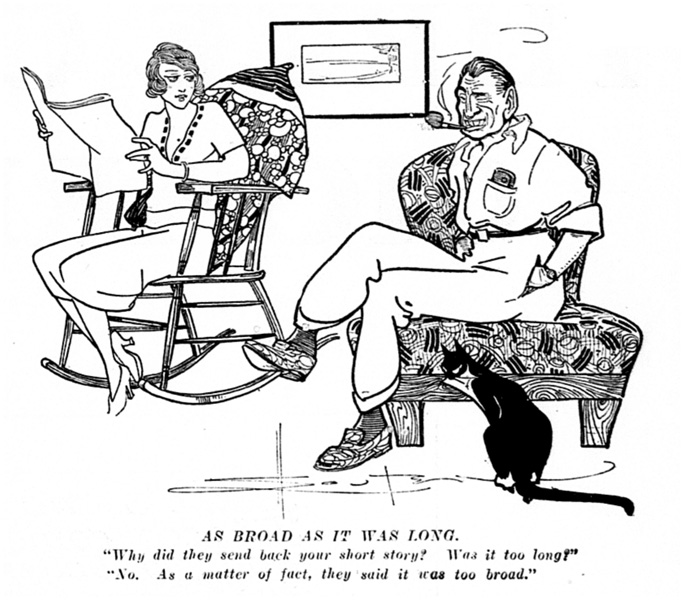
First published in The Bulletin, 22 June 1922
This phenomenon, among others, is being discussed by upwards of 200 men and women from many parts of Australia at the third annual Science Fiction Convention, which was officially opened yesterday in Sydney.
Most of the magazines now on sale look as though they have arrived from Outer Space. In fact they have come from the United States, by way of Britain.
Science fiction, broadly, is a story that begins something like this:
"Two hours before the vessel plunged into minus point, building up for a hundred and fifty parsec jump through hyperspace, Captain Jack Warren was so high on narcol he couldn't read his own manifest . . . it was too late. The skags had taken over control of the ship."
Around the world there are now about 50 such magazines in 15 languages, and about 40 of them originate in the United States.
However, the deluge into Australia does not mean that the number of Australian followers has increased so suddenly.
There is simply a bigger variety of the magazines available here. The dollar restrictions since 1940 have blocked American publications, but now they are being reprinted in Britain.
An executive of a large wholesale magazine distributing firm in Sydney told "The Sun-Herald":
"We're testing the market. In this State the Westerns are dropping back a bit in sales and science fiction is taking their place in popularity, but not yet spectacularly.
The Professors Can Relax
"A few of the science fiction magazines are really just crude Westerns dressed up in space-suits and swimming costumes. But many are far from moronic -- even some with the sexiest or most gruesome covers.
"Those covers are only a come-on. The writers, it seems, won't pander. Trouble is," he added regretfully, "the readers som times have to be pretty bright to understand them.
"In America the publishers have had to issue a couple of books which are virtually popular science dictionaries, so that new s.f. fans can know what they're reading about."
Some of the Australian readers hardly ever need a glossary, for quite a few are honours graduates in physics, mathematics and engineering.
Professors used to relax with a crime story. Now the hand gropes on the bed-side table for "Astounding Science Fiction," "Galaxy," or "If". After all, this new reading is itself detective fiction of a sort.
An American high priest of the cult declares that it can render a great public service by "pointing out the probable results of present trends in science, and then letting the reader decide whether that's what he wants."
But the British novelist J. B. Priestley, after confessing recently that he had read "a good deal" of American science fiction, went on to denounce a current trend in the stories.
"Having ruined this planet," he wrote bitterly, "we take destruction to other planets. It is a move undertaken in secret despair, in the wrong direction . . .
'The rocket ships no longer represent man's triumphant progress. They merely show him hurrying at ever-increasing speeds away from his true life as a spiritual being."
A reasonable-voiced supporter of science fiction, Mr. Vol Molesworth, director of the Futurian Society of Sydney, makes this reply:
"The idea of embodying scientific ideas in fictional form fills an urgent educative need. It's not new. It started with the Socratic Dialogues."
Purists apparently date the birth of modern science fiction at about 1926. Jules Verne and H. G. Wells, to their mind, were not sufficiently scientific in their predictions.
They declare that fantasy is strictly different from science fiction, and even when they admit that the two are usually merged in the magazines they add that science has had a habit of overtaking intelligently conceived fantasies.
They Exchange Fanzines
In Sydney a small group of the more enthusiastic readers formed the Futurian Society on the eve of the World War I. To borrow one another's magazines and books and hold their abstruse discussions, these addicts met on Thursday nights in a coffee shop.
Last year they made their present clubrooms in an old Darlinghurst factory, visited fairly regularly by about 100 enthusiasts.
Similar groups exist in the other capitals, and there are lesser groups about the Sydney suburbs. Between some rival groups there is even admittedly a certain amount of bad feeling.
This week-end, in Federation Hall, Philip Street, the Science Fiction Convention is fascinatedly tracing out paths man's future may take.
A B.Sc. and two B.A.'s have given addresses in a symposium on The World of To-morrow. ("If you want to see the future, look at yesterday and to-day", was a sober keynote); and to- night there will be a "variety" session.
The membership of the organised science fiction groups in Australia, the convention visitors learned, is still small but it's growing. And there is no doubt about the members' keeness.
At least 15 of the groups circulate their own papers, some roneoed and some printed, containing reviews, comment and amateur science fiction.
"Fanzines" (fan magazines), these are called, as distinct from prozines, or professional magazines.
Yes, they adore new words, these science-minded students of strange goings-on in strange worlds along the time-space continuum -- and not all the words, certainly, are strictly scientific.
Back, for example, to the story of Captain Jack Warren's adventures, which ends:
"When last heard from, K'Gol and his skag companions had settled down to conferring with terrestrial scientists, making and discarding countless plans to revive the Rigel culture, and drinking narcol . . .
"Who knows the mind of a skag?"
[Thanks to the National Library of Australia's newspaper digitisation project for this piece.]
Best Novel
The Courier's New Bicycle, Kim Westwood (HarperCollins)
Best Novella or Novelette
"The Past is a Bridge Best Left Burnt", Paul Haines, in The Last Days of Kali Yuga (Brimstone Press)
Best Short Story
"The Patrician", Tansy Rayner Roberts, in Love and Romanpunk (Twelfth Planet Press)
Best Collected Work
The Last Days of Kali Yuga by Paul Haines, edited by Angela Challis (Brimstone Press)
Best Artwork
"Finishing School", Kathleen Jennings, in Steampunk!: An Anthology of Fantastically Rich and Strange Stories (Candlewick Press)
Best Fan Writer
Robin Pen, for "The Ballad of the Unrequited Ditmar"
Best Fan Artist
Kathleen Jennings, for work in Errantry (tanaudel.wordpress.com) including "The Dalek Game"
Best Fan Publication in Any Medium
The Writer and the Critic, Kirstyn McDermott and Ian Mond
Best New Talent
Joanne Anderton
William Atheling Jr Award for Criticism or Review
Alexandra Pierce and Tehani Wessely, for reviews of Vorkosigan Saga, in Randomly Yours, Alex
You can read the shortlists here.
The following awards were also presented at the same ceremony:
The A Bertram Chandler Award: Richard Harland
The Norma K Hemming Award: AA Bell, for Hindsight, and Sara Douglass, for The Devil's Diadem
The Peter McNamara Award: Bill Congreve
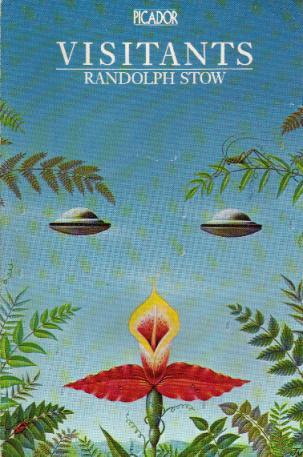
Visitants by Randolph Stow, 1971
Cover illustration by James Marsh
Picador edition 1981
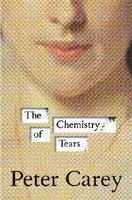 |
The Chemistry of Tears Peter Carey Penguin Books 2012 |
From the publisher's page:
When her lover dies suddenly, all Catherine has left is her work.
The long affair had been kept secret from their colleagues at London's Swinburne Museum and now she must grieve in private. Or almost. In an act of compassion, the head of her department gives Catherine a very particular project, something to cling onto: a box of intricate clockwork parts that appear to be the remains of a nineteenth-century automaton, a beautiful mechanical bird.
Once she discovers that the box also contains the diary of the man who commissioned the machine, one obsession merges into another. Who was Henry Brandling? Who was the mysterious, visionary clockmaker he hired to make a gift for his ailing son? And what was the end result that now sits in pieces in Catherine's studio?
The Chemistry of Tears is a portrait of love and loss that is both wildly entertaining and profoundly moving, simultaneously delicate and anarchic.
At its heart is an image only the masterful Peter Carey could breathe such life into - an object made of equal parts magic, love, madness and science, a delight that contains the seeds of our age's downfall.
Reviews
Andrew Miller in "The New York Times": "There is, of course, a certain base curiosity in seeing how persuasively a writer crosses the gender divide. How well does Carey, a 60-something author of Australian origin, long resident in New York, inhabit the skin of a prickly, 40-something, middle-class Englishwoman? It is, perhaps, in his depiction of Catherine as a technician, a professional piecer-together of old and elaborate things, that he presents her most effectively, most winningly. He has clearly done a vast amount of research into what conservators and curators do in modern museums. The Swinburne and its unlovely annex are always entirely convincing places, and there is much incidental pleasure in learning about the place -- the tools, the dust coats, the fume cupboard, the elaborate hierarchies...In an interview a few years ago, Carey spoke of admiring the quality of "risk" in works of fiction. This, I think, is exactly right, risk being an index of a book's and a writer's ambition. The Chemistry of Tears takes risks, is quietly ambitious and is, in its last pages, both touching and thought-provoking."
Ron Charles in "The Washington Post": "This is the third of Carey's cerebral short novels about the provenance of curious objects. In My Life as a Fake (2003), he scanned the slippery lines of a fraudulent poem; in Theft (2006), he swirled through the palette of art forgery. In The Chemistry of Tears, his heroine picks through hundreds of corroded springs, tarnished silver rings and glass rods gunked up with old glue...Amid the smoke of mysticism rising from these pages, how reassuring it is to come upon Catherine's complaint that 'the account was filled with violent and disconcerting "jump cuts". . . . In fact, you soon learned that what was initially confusing would never be clarified no matter how you started and swore at it. One learned to live with fuzziness and ambiguity in a way one never would in life.'...That warning should be printed on the spine of The Chemistry of Tears for anyone tempted to peer into this 'sea of ambiguity, delusion, wonder, possibility, amongst all the murk and confusion.' No other popular literary author is so wily -- so willful about letting us remain in the fog."
AS Byatt in "The Financial Times": "This is not an easy book to read. I was haunted throughout by the sense of a pattern of ideas that I couldn't grasp. At the other extreme, Carey creates Catherine's lonely and obsessive misery so brilliantly that it is both painful and claustrophobic for the reader. The first page is arresting and shocking and it goes on that way. We share her pain and we also share Henry's pain for his sick son - though it is interesting that Catherine doesn't. She remarks that it is hard to imagine how one could care as much about a child as about a lover. She is completely convincing and not altogether nice...Carey's world is always interesting and thought-provoking. His splendid Oscar and Lucinda (1988) also combined a wonderful artefact - a glass cathedral - with the mathematics of gambling, and religious riddles and puzzles. At the end of The Chemistry of Tears Amanda produces another vision of what may be concealed in the hull of the automaton. There is a mystery I haven't understood about a blue cube. The novel is baffling as well as exciting."
Andrew Motion in "The Guardian": "Carey has tackled some of these ideas before (the most obvious precursor to the construction of machines in this book is the transportation of the church in Oscar and Lucinda). But here everything has been designed, tooled, oiled and fitted together with greater economy and an equal panache. Does this mean the book ends too neatly? No. Even as it settles its main concerns, it floats new ideas (was golden boy Carl the young Karl Benz?), and emphasises latent themes (the greater love between parents and children; the endless human capacity for misunderstanding)."
Nina Caplan in "The Independent": "This novel lacks the wicked energy of Parrot and Olivier or Theft: A Love Story. But if Carey's best books are superlative, the next tier down is still better - meatier, more imaginative - than many writers ever manage. The Chemistry of Tears is awash with grief, some of it Carey's: for the breathless faith in our own perfectibility that has degenerated into environmental disaster. All those clever, delicate hands and brains - who knew they would wind up wreaking such havoc? We are truly a sulphurous species."
Troy Jollimore for "The San Francisco Chronicle": "In the real world - that is, ours - the Difference Engine was designed by Charles Babbage, on whom Cruickshank is partially based. Mixing fiction and historical fact is a favored strategy of Carey, who has dipped his pen into bygone eras several times before and twice won the Booker Prize for it (for Oscar and Lucinda in 1988 and for True History of the Kelly Gang in 2001). This ambitious, playful and engagingly strange novel does not, perhaps, burn quite so brightly or shimmer quite so beguilingly as Carey's best books. But it is still quite lovely, and rather like an automaton, it does seem to add up to more than the sum of its parts."
"The Complete Review" weblog: "Carey's two main characters do not act entirely rationally -- both having the excuse of the emotional stress they're under, justifying (or explaining) how they act. (Catherine also self-medicates to considerable excess, which also leads to more impulsive behavior.) There's a surprising amount of physical lashing out in the novel by the characters, a striking contrast to the very predictable and planned movements of, for example, the mechanical swan...The mechanical offers a predictable -- and lasting -- perfection that the human body can't match...Messy life, as Catherine and Henry (and everyone else) live it, of course, doesn't allow for such simple perfection...Carey cleverly works with these contrasts in his often beautifully written and artfully constructed novel."
Interviews
Nina Caplan for the "New Statesman".
Jan Dalley for "The Financial Times".
Simon Mann for "The Age".
Other
YouTube book trailer:
The author introduces his book:
In this green valley under this blue sky.
I think the air, the day, the grass, and I
May breathe some secret to all else unknown.
I have a kinship with the leaves down blown
I shared with them when I was two feet high.
The very tremor of the breeze's sigh
Trembles in me and seems to be my own.
I shall lie here and wait and listen long,
And look and wonder, steal from laggard time
This air, this day, this grass, and make for you,
Stronger than life itself, a little song.
What shall I say more than this single rhyme:
"How green this valley is, this sky how blue?"
First published in The Sydney Mail, 12 August 1925
Garth Nix talks to "Wired" magazine about his upcoming novel, the lost video game, and his past and future writing. Question: could the photographer get any CLOSER?
Gavin Aung Than is a freelance illustrator living in Melbourne. He creates comic strips out of inspirational quotes and he recently picked up Neil Gaiman's recent commencement address at the University of the Arts in Philadelphia. Gaiman, who keeps an eye on these things, found the strip and hopes to thank the artist personally next time he's in town.
"The Guardian" newspaper in the UK, in association with National Book Tokens, has launched an interactive literary map of the UK, allowing you to zoom in on bookshops, bookish events and literary connections based on location. Oh, for an Australian version.
The news is out that the 2012 Melbourne Writers Festival program will be available on July 20.
"Up the Country."
The modest title of the book is confirmed by the preface, where the author says that "if only half a dozen genuine old pioneers commend the verisimilitude of their story as here writ down I shall be rewarded extravagantly in excess of my desserts." Brent of Bin Bin surely has his reward. Old pioneers, both in his own lovely district, "where the winds and the streams are made," and in all places like it by aspect and history, will surely say he has achieved "verisimilitude." More than that, he has achieved something like ecstasy, a communicable delight in fine memories.
The book could be called, like some old-fashioned romances, by the names of its chief families. "The Pooles and the Mazeres, or Laughter and Tears" (such books always had a sub-title). But, no, I am wrong in suggesting that "Up the Country" is an old-fashioned book, with its characters seen as if through the wrong end of a tele- scope. Its characters may wear crinolines, but their hearts and speech are young, contemporary. Here is some of their talk:
"You've mourned long enough for poor Emily now. You oughtn't to waste your life any longer. It's a pity for you to be an old bachelor when you see the kind of husbands many women have to put up with."
"That's all very fine, but who'd I marry? I can't go mashing after one of those little squeaking girls that I see about."
That very modern horror of flappers! The second speaker was the hero of the book, Bert Poole. A glorious figure of a bushman, from boyhood to middle age, capable, alert in all his senses, the mainstay of the country-side, Bert Poole was adored by every one of the girls (little squeaking ones and older), and imitated by all the men. If Brent of Bin Bin had done nothing but render the personality of Bert Poole, and make it credible, his book would have been worth writing. But such a man is incomplete without his environment, and that is given, too, his environment, human and physical.
Bush Ecology.
There is a rather new branch of science called "ecology." It must have existed long years ago without being defined: it was the basis of every bushman's power. An English scientist described ecology recently in this way:
An ecologlst is a field-naturalist, who concentrates attention on the relations between one species and another, on their reactions to their environment, on their numbers, birth rates, death rates, and movements. He has to know a little of everything. When an ecologlst says, "There goes a badger," he should include in his thoughts some definite idea of the animal's place in the community to which it belongs, just as if he had said, "There goes the vicar!"
So much for ecology in general. Now let us see what the ecology of Bert Poole and his friends amounted to:
Every nook of Eagle Hawk Gullies was familiar to them, it having been their playground ever since they bestrode a horse. They were not to be deceived by any beast or bird that ran, flew, swam, crawled, or burrowed in its environs. Brands were a superfluous means of identification: one glance at a cow or colt and they could make an affidavit as to its dam or sire on points.
Or again, of Bert himself:
He could glance at a forest giant and tell which way it would fall to his axe, and how many slabs it would yield to fashion his habitation. ... He could canter over a stretch of country and estimate how many acres it contained, and how many beasts it would graze. . . . There wasn't a beast from the Upper Murray to the Murrumbidgee that he didn't know by the cut of its jib, and no bird could call to its mate, nor outline its wing on the sky at dusk or dawn, without his reading it like the alphabet.
Not an ecology quite satisfying to the pure scientist, perhaps, but something much nearer to it than that of the average specialist, for the bushman had to "know a little of everything"; often he knew a great deal.
A Book of Adventures.
Being a chronicle of two families and their more significant neighbours, the book's high lights shine on those events that would be most inevitable to whole clans. It opens on the waters of the Great Flood, when brave, charming Mrs. Mazere insisted on crossing the river to help a sick woman. Bert Poole and a young mate rowed her over; strong men stood on the banks imploring her not to take such a risk. She won through quietly, and her consistent courage has been part of the district legends ever since. Another high light shone on an attack by bushrangers, in which Bert Poole, at first misunderstood, then glorified, came out very strong indeed. Then there was the tragedy of lovely Emily Mazere, drowned in her golden youth, a blow for the whole district. These events bind the district-life together, but the background is even more strongly drawn. There is the account of the rival clergymen when they first came to the district. Kind Mrs. Brennan was ill when the priest was to come, so Mrs Mazere, an Anglican, threw open the Mazere homestead of Three Rivers, and every one came to the service. Mrs. Brennan sobbed with joy, saying to her husband:
"There niver was nor could be such a woman agin as my dear Rachel Mazere. Now, ye listen to me, Timmy bhoy, whin next her heretic bishop comes to the district he spinds a noight in all honour at Brennan's Gap..."
She had to wait years, but it is part of the history of Bool Bool that the bishop was nearly smothered in the Brennan's goose-down bed, the only one of its succulent floculent proportions up the country. Thereafter it became customary for the chief of the Church of England when he came to spend a night in great state at Brennan's Gap, and for his colleagues to return the courtesy at Three Rivers.
The Homesteads.
"Up the Country" is a book of homesteads, huge, growing places with as many inhabitants, year in year out, as one of the country houses in Tolstoy's books. But there were no peasants:-
When war, gold rushes, or over-speculation affected the price of stock or wool, the squatters would be flush of money, or strapped for it, according to the swing of the pendulum. But they always had plenty of blood-horses to ride, prime beef to eat, fruit, eggs, cheese, butter, and vegetables, and were able to do their own work if put to it, whether building a new habit or habitation.
It seems necessary to quote at some length like this to show the racy idiom that pervades the book, alternating, unfortunately, with some heavy journalese now and then. "Flush of money or strapped for it" -- that runs very well; such phrases have been lived with.
Finally, it may be mentioned that, as "Bool Bool" is an old settlement in the Mother State, its frontier district is Queensland, whose gold rush takes in its wake many undesirables. So that was Queensland's function then! She has outlived it.
First published in The Brisbane Courier, 2 March 1929
Note: it was not until the 1950s that the author of this, and subsequent novels, was identified as none other than Miles Franklin.
[Thanks to the National Library of Australia's newspaper digitisation project for this piece.]
These awards are presented by the Australian Horror Writers Association to honour the best published works of horror by an Australian author.
The winners were:
Novel:
No Award.
Honourable Mention: The Broken Ones by Stephen M Irwin
Long Fiction:
WINNER: The Past is a Bridge Best Left Burnt by Paul Haines
Honourable Mentions:
And the Dead Shall Outnumber the Living by Deborah Biancotti
Sleeping and the Dead by Cat Sparks
From the Teeth of Strange Children by Lisa L. Hannett
Collections:
WINNER: Tales of Sin and Madness by Brett McBean
Honourable Mentions:
Bluegrass Symphony by Lisa L. Hannett
The Last Days of Kali Yuga by Paul Haines
Matilda Told Such Dreadful Lies by Lucy Sussex
Apocrypha Sequence (all four volumes) by Shane Jiraiya Cummings
Edited:
WINNER: Dead Red Heart ed. Russell B. Farr
Honourable Mentions:
More Scary Kisses ed. Liz Grzyb
Midnight Echo 6 ed. David Kernot, David Conyers and Jason Fischer
The Year's Best Fantasy and Horror ed. Liz Grzyb & Talie Helene
Short Stories:
WINNER: Shovel Man Joe by Amanda J. Spedding
Honourable Mentions:
Taking It for the Team by Tracie McBride
The Sea at Night by Joanne Anderton
The Wanderer in Darkness by Andrew J. McKiernan
Out Hunting for Teeth by Joanne Anderton
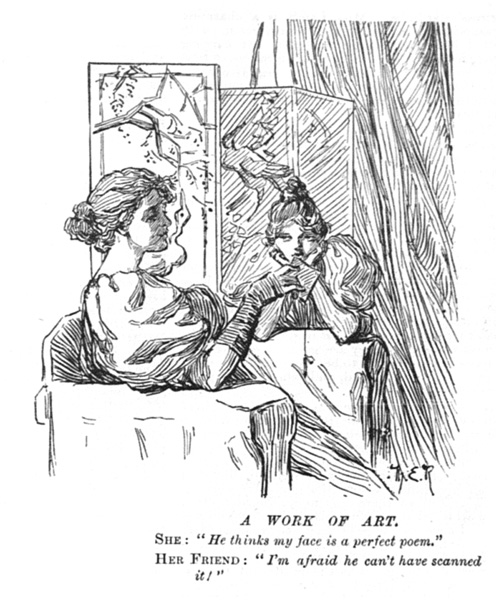
First published in The Bulletin, 4 June 1898
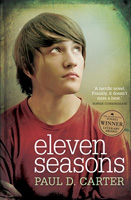 |
Paul D. Carter recently won the Australian-Vogel Literary Award for his novel Eleven Seasons. This is a rare beast, an Australian novel about sport, which follows the young career of Jason Dalton who joins the AFL team Hawthorn. The author spoke to Chris Flynn for "Readings". |
After setting out to write a sports story (inspired by the baseball prologue in Don DeLillo's Underworld), Carter quickly realised that there was more value in using AFL as a means to explore how young men mature into adulthood, or in some cases, avoid doing so: 'It's hard being young because you have no autonomy and you have a lot of anger, a lot of angst. Sport, music, fashion, having a place to go can help sublimate those feelings into a safe place, which is self-productive.' Eleven Seasons not only tackles these feelings of needing to belong but also raises vital questions about how cloistered education and young adult life can be.
'What's the difference between being a man and being an adult? Is the world of football, which is full of men, a substitute for being an adult? What is it that characterizes a man as being distinct from a boy? Richard Ford said in The Lay of the Land that being a man is all about showing hardness. I think that's pretty true. Male models never smile, Clint Eastwood never smiles, rich men on magazine covers never smile. There's a firmness, a hardness there, you've graduated from being a boy, you carry the weight of something. The best representations of masculinity often come across in performance. The characters in the book, particularly at the football club, are constantly expressing their manliness through bravado.'
When Mr. Roy Bridges startled "The Times" into reviewing his "Vale of Tyre" at great length, Australian reviewers took heart of grace, realising that a notable novel, written in Australia and published in London was a possibility. When, more recently, Mr. Dale Collins published the most enthralling story of adventure at sea since "Treasure Island," it became possible to claim a great novelist for Australia. Ever since, one picks up a novel by an Australian author with a sense of pleasurable anticipation which is quite illogical and quite often unjustified. In a population of less than six millions, carrying, perhaps, a larger proportion suffering from cacoethes scribendi than is usual in older countries, it is absurd to expect a very large number or a very high percentage of literary successes. We have, considering population, an amazing number of better than average versifiers and minor poets; we have two or three really good novelists. That is a literary record of which a young and sparsely populated country may well be proud. Yet a reviewer may perhaps be forgiven for deploring the publication of second and third rate novels by Australians, as tending to lower a standard set proudly high by Australia's literary pioneers.
Perilously close to this category of second-rate Australian novels falls unhappily, the latest effort of Miss Zora Cross. With every desire to be sympathetic and encouraging toward an author who has written much good and almost good verse, it is impossible to write enthusiastically of this novel, "The Lute Girl of Rainyvale." Its central theme is Art (with a large capital), yet one of the characters is made to say of an early Lindsay drawing "Has anyone in Australia such an art treasure? Has anyone in this world? I like to think not." London, which recently saw and passed judgment upon a representative Lindsay collection, is likely to smile indulgently at such naive hero-worship as that. Furthermore, London (assuming that London reads "The Lute Girl of Rainyvale") will draw from these pages a strange picture of Australia as a whole and Queensland in particular. Many of the characters are Chinese; educated Chinese, who are made to fit with an appearance of complete naturalness into an Australian background. A stranger would be likely to receive the impression that wealthy Chinese of collecting habits and sauve manners were a normal feature of the Australian landscape. Throughout Miss Cross shows a knowledge of many highly interesting chapters of Chinese mythology, and for this reason alone many readers will find a curious charm in the book.
"The Lute Girl of Rainyvale," by Zora Cross. Hutchinson's, London. 7s. 6d. From Albert's, Ltd.
First published in The Western Mail, 6 August 1925
[Thanks to the National Library of Australia's newspaper digitisation project for this piece.]
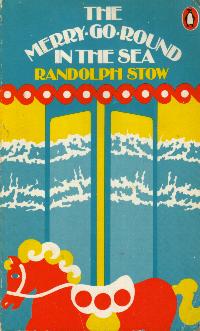
The Merry-Go-Round in the Sea by Randolph Stow, 1965
Penguin edition 1982
Best Designed Book of the Year
Love Lace: Powerhouse Museum International Lace Award (Powerhouse Publishing), designed by Toko
Best Designed Cover of the Year
The Art of Pasta (Lucio Galletto & David Dale, Penguin), designed by Daniel New
Young Designer of the Year
Hannah Robinson for And Red Galoshes (Glenda Millard & Jonathan Bentley, Hardie Grant), The Elegant Art of Falling Apart (Jessica Jones, Hachette), Wide Open Road (Tony Davis, ABC Books), and Chasing Odysseus (S D Gentill, Pantera Press).
Best Designed Children's Cover of the Year
August (Bernard Beckett, Text), designed by W H Chong and Susan Miller
Best Designed Fiction Book
Love in the Years of Lunacy (Mandy Sayer, A&U), designed by Emily O'Neill
Best Designed Nonfiction Book
Hiroshima Nagasaki (Paul Ham, HarperCollins), designed by Matt Stanton and HarperCollins Design Studio
Best Designed Literary Fiction
Foal's Bread (Gillian Mears, A&U), designed by Sandy Cull, gogoGinko, and Yolande Gray
Best Designed General Illustrated Book
The Flight Attendant's Shoe (Prudence Black, NewSouth), designed by Di Quick
Best Designed Specialist Illustrated Book
Love Lace: Powerhouse Museum International Lace Award (Powerhouse Publishing), designed by Toko
Best Designed Cookbook
The Art of Pasta (Lucio Galletto &David Dale, Penguin), designed by Daniel New
Best Designed Children's Fiction Book
Alaska (Sue Saliba, Penguin), designed by Allison Colpoys
Best Designed Children's Nonfiction Book
Drawing Life for Kids: My Art Journal (Queensland Art Gallery), designed by Amy Moore and Sally Nall
Best Designed Children's Picture Book
Ben & Duck (Sara Acton, Scholastic), designed by Nicole Stofberg
Best Designed Children's Series
Star League 1: Lights, Camera, Action Hero! (H J Harper, Random House), designed by Nahum Ziersch and Astred Hicks, Design Cherry
Best Designed Young Adult Book
August (Bernard Beckett, Text), designed by WH Chong and Susan Miller
Best Designed Reference and Scholarly Book
Swainston's Fishes of Australia (Roger Swainston, Penguin), designed by Clare Tice
Best Designed Primary Education Book
Life Cycles of Australian Animals: Echidna (Greg Pyers, Pearson), designed by Glen McClay and Nikola Kyle
Best Designed Secondary Education Book
Oxford Big Ideas Australian Curriculum, Mathematics 8 (Nolan et al, OUP), designed by Sandi Dani and Trampoline, and Santiago Villamizar
Best Designed Higher Education and Tertiary Book (tied)
Graphic Design Australian Style Manual (Barnum et al, McGraw-Hill), designed by Astred Hicks and Emily and John Gregory
Principles of Microeconomics, 5th edition (Gans et al, Cengage), designed by Leigh Ashforth and Olga Lavecchia
I'm grateful to "Readings" and "booknerd" for the details. The "Readings" site has reproductions of all the bookcovers, bar the academic ones, and is definitely worthwhile checking out.

|
Tony Cavanaugh has been best known to date for his scriptwriting for film and television. Now he has turned his hand to a novel and has produced Promise, about a psychopath who targets teenage girls. He was interviewed by Steve Dow for "The Age": |
It took Cavanaugh, who lives on the Gold Coast, just three months of full-time writing, often beginning at 3am, to produce Promise, about a psychopath, Winston, who stalks the Sunshine Coast hinterland armed with extensive readings in the serial killer literary canon and the psychological tropes of "cognitive thinking" and "catastrophising", and who is being pursued by Darian Richards, a retired, clever and superficially misanthropic homicide detective.
Clearly there was a creative upside to the dark mood in which Cavanaugh found himself after the recent "reasonably traumatic" collapse of his marriage to film writer and director Simone North - he produced her film I Am You, based on the real story of the murder of a teenage girl - but he wouldn't recommend others follow a course of separation and divorce to fuel a first novel.
The father of three has dedicated Promise to his children Delaware, Charlie and Scarlett, but wants his youngest to wait before reading it; the graphic noir nature of Winston's brutality required the author to take cold showers.
Always within your heart eternal spring!
Truth more to you than petty party strife,
Helping by service every livinge thing;
Ever humanity, no self-love there,
Reverence for every individual soul.
In all you saw a father's tender care.
No heart too stained to help, uplift, make whole;
Ever was brotherhood your aim and goal.
Hail! "Grand old woman" of our hemisphere!
Energy ceaseless fired your mind and heart,
Love, your unfailing strength, brave friend sincere,
Earnest in all you did, with truth your art,
Noble, and happy soul, still play your part.
Speed on, great spirit, heaven is your home.
Progress your watchword ever, there as here,
Eternal youth, with greater things to come
Now gives you wider scope in higher sphere.
Comrade, inspire us still, your spirit near,
Ever you live in love, for ever dear.
First published in The Register, 2 November 1925
Margo Lanagan has been a tad busy with Writers' Festivals this year and is now looking forward to spending some time just contemplating her own writing. Between further literary commitments of course.
Susan Johnson has figured out how to link to PDF files from her blog, and has now linked to a recent piece of journalism she wrote regarding her latest novel, and the question of how much of your own life you should plunder for your fiction. I thought along those lines once until I figured out I just didn't have a life worth plundering.
After "... twelve years of careful writing, revising, deleting, setting random pages of my manuscript on fire during intermittent moments of neurosis and depression, contending with the third-degree burns that came from manuscript conflagrations..." etc etc, Edward Champion has finally finished his memoir. It's, well, rather short. But does, as he implies, have a sense of proportion.
I'm not sure any of my novels have any one big idea. I like the concept of a humongous idea striking suddenly, after months or possibly years of lying around doing not much at all, allied with the popular belief that post-lightning all you have to do is retreat to a darkened room and bash out the words, a kind of a minor bureaucratic tidy-up after the brilliance of the lightning bolt.
Maybe it does work like that for some writers. But for me the ideas are more like sparks of static electricity. Mostly small, and myriad, and occasionally annoying. They are also not random, but generated by the act of writing (in which I would include daydreaming, note-jotting and open-mouthed musing to say, the neighbourhood cat). The writing generates more ideas, in turn inspiring more writing, which generate more ideas and so on.
In the case of A Confusion of Princes, it would need the psychoprobe of classic science fiction to identify and separate all the ideas and the seeds for those ideas. This is because it took me a long time to write this book, while I was also writing other books, so I can't remember. (To tell the truth, even when I write a book quickly I find it difficult to identify the genesis of any particular idea. Usually I just make something up that sounds plausible.)
There are three categories of prize awarded under the Literature award, these being:
Melbourne Prize for Literature - basically a lifetime achievement award for a Victorian writer
Best Writing Award - for a one-off piece of writing
Civic Choice Award - winner of a public choice
Entries are now open for these prizes (they close July 16) and the finalists will be exhibited in Federation Square in Melbourne between November 5 and 19 2012.
Previous winners of the main award are: Helen Garner in 2006, and Gerald Murnane in 2009.
To be sure, for 30 years Catherine Spence used her brother's name to sign her articles, but she had a message, and she was determined to deliver it without being side-tracked by any irrelevant nonsense about what sex one ought to belong to.
Her message was a strange one for a woman of that day; she believed passionately in democracy, and she believed even more passionately that democracy could not exist without proportional representation, or "effective voting," as she preferred to call it.
It was to the campaign for proportional or preferential voting, which nowadays we take so much for granted, that she devoted the whole of her long life, sparing neither time, energy, money, nor health to bring it about.
Catherine Helen Spence is identified with Australia as a whole by the cause to which she dedicated her life; she is identified with South Australia and the city of Adelaide in many ways besides.
In a sense, she grew up with South Australia, for the colony was only three years old when she arrived there with her family in 1839 at the age of 14.
She was born at Melrose, on the Tweed, in Scotland, in the romantic neighborhood of Abbotsford and Sir Walter Scott. One of her earliest memories was of the funeral procession of the great novelist winding its way to Dryburgh Abbey, where so many of her own family were buried.
"I account myself well born," she says in a memorable sentence, "for my father and mother loved each other. I account myself well descended, going back for many generations on both sides of intelligent and respectable people. I think I was well brought up, for my father and mother were of one mind regarding the care of the family."
A better description of gentle birth could hardly be devised.
Her father was David Spence, a lawyer, and her mother, Helen Brodie, daughter of one of the most enterprising farmers in Britain.
Young Catherine, who was fifth among eight children, had a happy childhood, and for those days an exceedingly good education.
Languages were well taught, and a love and a discriminating taste for good books were stimulated and encouraged along with the more "womanly" pursuit of fine needlework.
Catherine, indeed, was set fair for an academic career, with Edinburgh as her goal, when her gentle, incurably trusting father was ruined by wheat speculations. With recovery impossible, David Spence, fortified by a gift of £500 from his wife's people, took his family to Adelaide.
Their early years in this hard, raw, new colony were extremely difficult, and David Spence lived only six years longer.
For some months after they landed, the family lived in a tent on Brownhill Creek, and sold milk from their small herd of cows.
During this period they lived chiefly on rice -- it was the only cheap food, and Spence bought a ton of it. Later he got the job of Town Clerk of Adelaide at £150 a year, but lost it again with thc break-up of the municipality.
In 1843, to help the family finances, Catherine went out as a governess at sixpence an hour, and the knowledge that she had 5/- a week to put into the common fund restored her sense of independence and dissipated her shyness.
Meanwhile, she was writing for the Press, a modest beginning with stray verses and an occasional letter to the "South Australian," anonymous, of course.
Later she ran a small school, with the help of her mother and sisters, but in 1850, when she was 25, she gave up teaching and turned to novel-writing.
In all she wrote seven novels, and though fiction was never more than a by-product of her intensely busy existence, her writing is competent and professional, and she has her own distinct and not unimportant place in the development of Australian literature.
Her first two books, "Clara Morison" and "Tender and True," were published in England, and though well reviewed netted their author only £50 between them. The third, "Mr. Hogarth's Will," into which she wove her ideas about voting, yielded £85, but this included serial rights in the Melbourne "Telegraph."
Her best novel, and her last, "Handfasted," was never published at all; it was submitted for a prize of £100 offered by the "Sydney Mail," but the judge "feared it was calculated to loosen the marriage tie -- it was too socialistic, and consequently dangerous!"
In 1859 Catherine received the inspiration for what was to be her life's work.
The English philosopher John Stuart Mill had written a pamphlet advocating Thomas Hare's scheme for proportional voting, and, fired with enthusiasm after reading it, Catherine lost no time in getting her own views on the subject into print.
At that time she was Adelaide correspondent for the Melbourne "Argus" (under her brother's name), but the "Argus" showed no enthusiasm for their employee's new ideas; it recognised them as ingenious, but said it was definitely committed to block voting and that was that.
Two years later, when telegraphed news services made Catherine's work as correspondent unnecessary, she began to write a series of letters to the Adelaide "Register" on her pet theme, signed with her initials.
Her brother John encouraged her to write a pamphlet, and got it printed under the title of "A Plea for Pure Democracy." It was described by John Stuart Mill, Thomas Hare, and other authorities as the best argument from the popular side that had been presented.
Through the kindness of friends, Catherine was enabled to visit England and Scotland in 1865. During her visit she met Thomas Hare himself, and Rowland Hill, then better known as a post-office reformer than as a pioneer of effective voting, and the great Mill also, as well as George Eliot and many less dazzling celebrities.
She and Mill enjoyed each other's society very much, but her meeting with George Eliot was something of a fiasco, and Catherine gives an amusing account of it in her autobiography. George Eliot apologised handsomely years later for her brusqueness, which was caused by ill-health, and Catherine never ceased to regard her, together with Jane Austen, as one of her favorite English novelists.
By this time, of course, Catherine Spence was a well-known public figure, and her services were in demand in Adelaide for all sorts of reform projects.
She was a pioneer in the fight to provide destitute children with normal home lives instead of allowing them to be herded together in institutions; and for 14 years she worked hard to help make the foster-parents scheme under the Boarding-Out Society the success it undoubtedly became.
The movement spread to other States and to New Zealand, while a little book Catherine wrote on the subject, "State Children in Australia," reached the desk of the Under-secretary of State in the British Government and greatly influenced the preparation of the Children's Bill that came before the House of Commons in 1908.
Public speaking was another activity for women pioneered by Catherine Spence. She began in a modest way with travel and literary talks, but later on branched out into preaching and political speaking. She had abandoned the gloomy Calvinism of her forefathers, with its doctrine of predestination, and had joined the Unitarian Church, whose pulpits were open to women ministers.
Catherine was frequently in demand as a preacher, not only in Adelaide, but in Melbourne and Sydney, and later in America.
An address given at the Unitarian Church in Sydney on the subject of International Peace gave her the opportunity to express her disapproval of the South African War, and she was described (by the Sydney "Bulletin") as "the gallant little old lady who has more moral courage in her little finger than all the Sydney ministers have in their combined anatomies."
As one might imagine, Catherine had little time in her life for romance; she had two offers of marriage in her whole life, both of which she declined. She said in later years that though she had often envied her friends the love of their children, she had never envied any of them their husbands!
Books, pamphlets, and articles on all sorts of subjects poured from her tireless pen. She was a pioneer of educational reform in South Australia, and wrote a notable little book on civics called "The Laws We Live Under" for use in State schools.
She was a foundation member of the Adelaide Hospital Commission and gave help to women's suffrage movements.
She was guardian time and again throughout her long life to the orphan children of friends or relations; she kept up her literary studies and taught herself Latin; and all the while "carried her flag" for proportional representation up and down the continent, speaking at meetings, and travelling under all sorts of discomfort and hardships.
In 1893, at the age of 68, she left for a lecture tour of America as a Government Commissioner and a delegate to the World's Fair Congress in Chicago. Her visit was an enormous success, and her passport to the hearts of progressive Americans was the fact that she came "from Australia, the home of the secret ballot!"
This incredible woman, nearly 70 years old, travelled up and down the United States, addressing meetings, preaching from pulpits, and giving interviews to the Press. She met many famous people, including Henry George and Oliver Wendell Holmes, as well as the young Helen Keller, about to take her university degree.
One homely little touch is the way Catherine was impressed by the superiority of American domestic arrangements, even 56 years ago. She speaks of a terrace of 40 houses in Brooklyn, all warmed by central heating from one furnace, with hot water laid on, lifts, and "cupboards everywhere, ensuring the maximum of comfort with the minimum of labor."
On her return to Australia she had the satisfaction of seeing women in South Australia given the vote, and she herself was the first woman to seek election in a political contest, standing unsuccessfully as a candidate for the Federal Convention in 1897.
Her candidature aroused great interest and gave the cause of proportional representa- tion further impetus, especially with the example of Tasmania, South Africa, and Belgium before the world.
By 1902 effective voting had taken shape at least in the form of a Bill introduced into the South Australian Legislative Council, and by 1909, the year before her death, her goal was in sight, though she was not to witness the final victory.
Catherine's mother had died in 1884 at the age of 97, and though Catherine remained cheerful and active, she never really recovered from the blow. At the age of 84, still young in heart and forward-looking, she sat down to write her autobiography, but left it unfinished at the point at which her mother had died. She herself died at Norwood, in South Australia, in April, 1910, and her autobiography was finished by her friend and colleague, Mrs. Jeanne Young, and published by the Adelaide "Register," for which she had written so long.
Mrs. Young's words are her most fitting monument: "No truer friend, no better helper, no more sympathetic worker on behalf of the distressed, the deserted, and the destitute ever lived than the 'Grand Old Woman of Australia.'"
First published in The Australian Women's Weekly, 16 September 1950
[Thanks to the National Library of Australia's newspaper digitisation project for this piece.]
